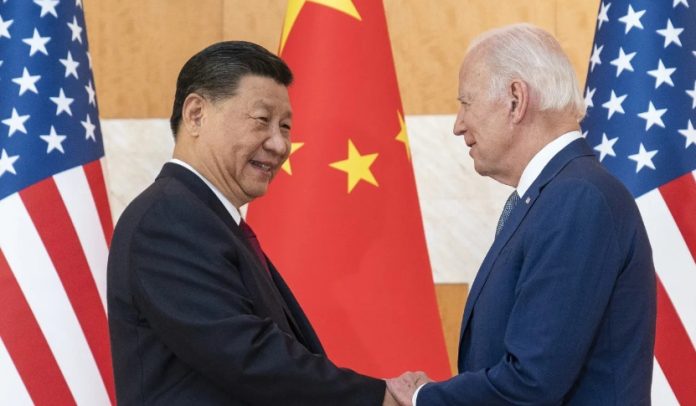US President Joe Biden will headline another major summit this week in a bid to demonstrate US global leadership, Digital Journal reports.
This time, the guests will include not only allies, but also Chinese President Xi Jinping.
Joe Biden is expecting in San Francisco 20 other members of the Asia-Pacific Economic Cooperation (APEC) forum, conceived three decades ago when Washington was confident that robust trade would be a unifying force for Pacific Rim nations.
However, that optimistic vision has come to an end, with the Biden administration pushing for only a limited economic pact in APEC and in recent months ramping up sanctions against China, which is seen as the main challenger to US global dominance, according to Digital Journal.
But with both the US and China expressing hope for greater stability, APEC offers Xi a unique chance to see Biden on US soil, as a visit to Washington is politically impossible and the US election is a year away.
At Wednesday’s meeting between Biden and Xi – the first since they met at the G20 summit in Bali a year ago – the leaders will discuss a wide range of differences, including Taiwan, whose elections in two months’ time could cause new tensions with Beijing, which claims a self-governing democracy and has not ruled out taking it over by force.
One US official suggested Xi and Biden would “open new lines of communication” amid a US drive to restore contacts between the two militaries, which are seen as particularly important to resolving the Taiwan crisis, Digital Journal reports.
Jude Blanchette, a China specialist at the Centre for Strategic and International Studies, said APEC risked “feeling like a sideshow ” for the other leaders in San Francisco, but they were also likely to be relieved by the meeting. He noted:
“Even countries in the region who are extraordinarily worried about China’s increasing aggression still have deep economic inter-linkages with China and at the margin would vastly prefer a stable US-China relationship to an unstable one.”
Russia will be represented by Deputy Prime Minister Alexei Overchuk, who is still the highest-ranking Russian visitor to the United States.
Biden, making an implicit contrast with his predecessor and rival in the upcoming election, Donald Trump, has focused on strengthening alliances, including through new formats such as a trilateral military pact with Australia and the UK, according to Digital Journal.
Despite China’s presence, the US will work with APEC allies to “resist any attempts to undermine international rules and norms,” Matt Murray, the senior US representative to APEC, told AFP. He notes that the organisation is well placed to host the Biden-Xi summit because APEC is non-binding and allows countries with differences to negotiate.
Among US allies, Australian Prime Minister Anthony Albanese, who has visited both Washington and Beijing in the past month, as well as Japanese Prime Minister Fumio Kishida and South Korean President Yoon Suk-yeol will attend APEC.
Before flying to San Francisco, Biden will welcome outgoing Indonesian President Joko Widodo to the White House as the US seeks to compete with China for the archipelago’s vast nickel reserves needed to make electric cars, Digital Journal reports.
San Francisco was chosen to host the summit because of its historic ties to Asia and its central role in global technology, but the APEC summit is unlikely to provide a respite from an issue that has occupied Biden’s attention for a month – the war between Israel and Hamas.
APEC includes not only Indonesia, the world’s largest Muslim-majority country, but also neighbouring Malaysia, whose Prime Minister Anwar Ibrahim has faced opposition calls to boycott the summit because of US support for Israel. APEC, which speaks of “economies” instead of “countries,” unusually includes China and Taiwan. Taiwan is represented not by a politician but by a businessman – Morris Chang, a historic figure in Taiwan’s semiconductor industry.
The US has lost control of free trade deals: Trump has withdrawn from the nascent Trans-Pacific Partnership, which was offered to Asian allies by his predecessor Barack Obama.
Instead, Biden came up with the Indo-Pacific Economic Framework for Prosperity (IPEF), which offers no market access but seeks to make it easier to do business between 14 countries that include Japan, India, Australia, South Korea and most of Southeast Asia but not China.
According to Wendy Cutler, former US trade negotiator and now vice president of the Asia Society Policy Institute, negotiations on one of the three parts of IPEF – supply chains – have been finalised and APEC may reach a conclusion on the other two – trade and clean energy.
